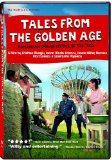| Reviews & Columns |
|
Reviews DVD TV on DVD Blu-ray 4K UHD International DVDs In Theaters Reviews by Studio Video Games Features Collector Series DVDs Easter Egg Database Interviews DVD Talk Radio Feature Articles Columns Anime Talk DVD Savant Horror DVDs The M.O.D. Squad Art House HD Talk Silent DVD
|
DVD Talk Forum |
|
|
| Resources |
|
DVD Price Search Customer Service #'s RCE Info Links |
|
Columns
|
|
|
Tales From the Golden Age
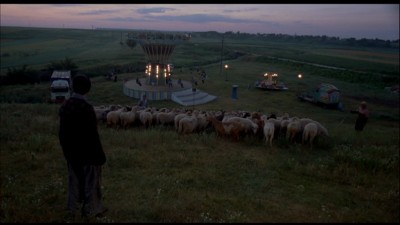
The first emotion that springs to mind when the fantastic contemporary crop of Romanian cinema is mentioned would probably not be laugh-out-loud amusement, and the same goes for the period through which that nation lived (from the mid-'70s through the '89 fall of the Berlin Wall) under notoriously oppressive Communist Party Leader/President Nicolae Ceausescu. Practically any Romanian alive during the Ceausescu era will tell you of the privation, paranoia, and personal and public stagnation that permeated the nation then; and the most well-known of those justly celebrated Romanian cinematic exports of recent years, Cristian Mungiu's Palme d'or-winning 4 Months, 3 Weeks, and 2 Days (itself set in 1987, near the end of the Ceausescu regime), is an exceptionally powerful and moving work, but one thing it's not is comical. A couple of years after that film's big success, however, Mungiu went back to the '80s with something very different in mind, writing six comedic/satirical short screenplays and getting together with some of his lesser-known and relatively untried colleagues in the rich Romanian cinematic-talent pool to turn those scripts into an omnibus film on the period, Tales From the Golden Age ("golden age" being the hackneyed and obviously untrue characterization typical in the propaganda of the Ceausescu regime). The result is something you would call unexpected and unusually excellent had we not come to expect this kind of incredibly smart, accomplished, eminently tone-sensitive, and masterful sort of picture from the new Romanian wave of filmmakers.
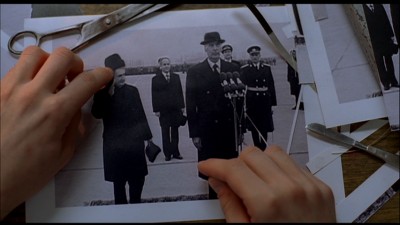
Mungiu's collaborators here are Constantin Popescu, Ioana Uricaru, Hanno Hofer, and Razvan Marculescu (the latter likely the most famous and accomplished of the gang aside from Mungiu, having had a hand in the screenwriting of both 2005's The Death of Mr. Lazarescu and last year's Tuesday, After Christmas). Though Mungiu is credited as the film's primary scribe, we are not told anywhere in the credits (and it has apparently never been publicly announced) which specific segments were directed by which specific auteurs, which gives the film a sort of playfully collective authorship, as if to retrospectively ameliorate (in a tongue-in-cheek yet defiant way) the fact that "playful" and "collective" were probably not words that went together very well during the Ceausescu years, when collectiveness was a virtue one was virtually (and sometimes literally) forced at hierarchical, hypocritical gunpoint to espouse. The film's first four episodes are more or less pure satire: In "The Legend of the Official Visit," a little Romanian village whips itself into a frenzy in preparation for an inspection by Party officials from the city, who are arriving to ensure that the town is in tip-top (read: not at all usual) shape for a possible visit by an international delegation, which the Party hopes to impress with visible signs of collectivist harmony in the Romanian countryside. A go-getting young aide, a stoical police chief, and the confused and reluctant gypsy operators of a visiting funfair, along with the rest of the town's denizens, have to drop everything to frantically put their best foot forward, while the weak-hearted mayor seems doomed to collapse before the increasingly demanding and absurd preparations are over. (A carnival ride on which the whole motley crew finds itself stuck with no way to get off provides, in the end, a half-poignant, half-stinging metaphor for the society of the time.) In "The Legend of the Party Photographer," a longtime, completely cowed photo editor for Scinteia, the party's heavily-edited house organ/official national paper, and his half-openly rebellious photographer nephew are harassed by party higher-ups to doctor a photo of the President so that he looks taller and more officiously respectable to the readership. In their imposed hurry, however, the two overlook a most important, most hilariously revelatory detail.
In "The Legend of the Zealous Activist," a wide-eyed and high-minded ideologue from Party Central in the big city heads to an impoverished and struggling rural village in order to light a fire under them, motivating them to meet at long last their literacy quota (one of the Party's well-intentioned, poorly-implemented initiatives being 100% literacy), only to find that most of the villagers are much too busily, pragmatically occupied with more prosaic concerns (electricity, roads, the exigencies of agriculture) to reach up and grasp the helping hand he imagines he's extending to them from some higher-minded, bettered place. In "The Legend of the Greedy Policeman," a middle-class urban family that insists on having a rationed, near-impossible to find pig for Christmas finds itself faced with the live animal in their apartment and must rely on their own morbid inventiveness to get the poor thing from the land of the living to their holiday table.
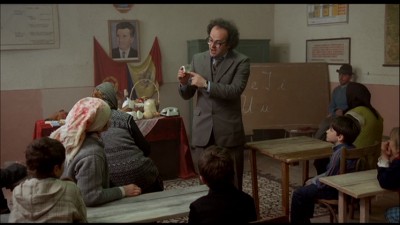
The final two episodes are longer, more subtle and tender, more directly connected in theme and tone, and share a style that, based on their close resemblance to the steadily-but-noticeably handheld, tense look/feel of 4 Months, 3 Weeks, suggests that Mungiu was the one principally in control behind the camera. "The Legend of the Air Sellers" follows the misadventures of a high-school-age young lady, a very responsible and hardworking student disappointed by her family's limited finances and her consequent inability to go away for the weekend with friends. She falls for a handsome devil she meets when he knocks on her door in an "official" capacity requesting a tap water sample in a bottle; she later discovers he is simply running a scam to amass a pile of bottles he collects his "samples" in (sometimes of water, sometimes of "polluted air") and exchange them for money at a glass recycling center. Another of his acts of rebellion is smuggling both a VCR and a tape of Bonnie and Clyde around to Romanian households, curious but forbidden from exposure to such Western decadence; the sad and humorous suggestion is that our lawbreaking would-be sweethearts, who become the Romanian "Bonnie and Clyde" after the young woman is tempted into a life of crime by his devil-may-care behavior, can do nothing more scandalous than getting a little taboo extra spending money for themselves by collecting bottles to sell. The last segment, "The Legend of the Chicken Driver," is a funny, but not at all ha-ha-funny, contemplation of the cruelty of fate. Here we are told the tale of a truck driver stuck in a lifeless marriage, who, along with a restaurateur along his route for whom he's carrying a well-hidden torch, devise a victimless scheme to make profitable use of the surplus (yet, as with practically everything, rationed) eggs from the chickens he's transporting--a victimless scheme for which, of course, the poor driver himself becomes the victim of nitpicking, punitive bureaucracy in the end. In both of these closing tales, the privations and micro-managing, inefficacious regulation are ridiculous and insulting, but the focus is on the initially droll and finally melancholy way in which these inefficient, illogical ways of doing things both bring people together and, in the end, inevitably and sadly separate them.
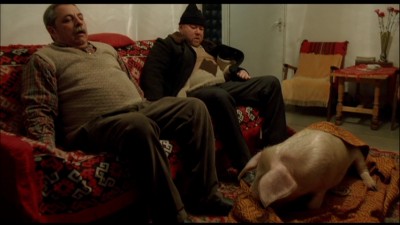
Each of the six shorts dramatizes and satirizes a different aspect of life in the Ceausescu years and, at least as they are assembled here (different versions of the collection have been shown in different orders internationally, sometimes omitting one or several of the episodes altogether), they have a nicely cohesive structure, running an arc from the more blatantly funny/satirical and anti-realist to progressively gentler and more naturalistic storytelling approaches. (They are also tied together by what seem to be facts of life of the era that pop up everywhere, which are not dwelt upon overdramatically but are very easy to spot in one way or another: unreliable electricity; the black market thriving behind Romanian bureaucracy; the resigned, bartering nature of all commercial and many interpersonal interactions). Both the writing and the technical aspects of each are superb; as usual in what I've seen of Romanian cinema, there is an extremely fine degree of both taste and ingenuity at work in the way the shots are constructed and framed/composed, as well as in the ways the camera is moved, that don't call attention to themselves but are very impressive when one realizes how atypically long in duration most of them are, how much these directors and actors can make happen in the unusually long interval they take between cuts.
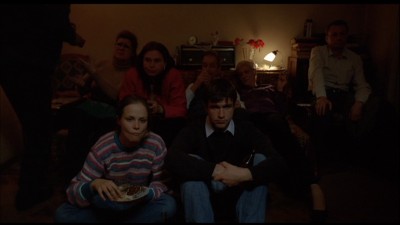
That's a tall enough order, even for drama, but for comedy, it's a markedly greater challenge: that deeply involving but tightrope-walking long-take way of shooting removes any crutch of frenetic cutting that might be used to artificially impose humor onto a film. Instead, the humor springs organically, from the writing and from the performances, costumes, and mise-en-scène, all of which seem to work of their own accord very quietly, seamlessly, and effortlessly--always the sign of the most serious, dedicated, and demanding effort in the making of any work of art or entertainment. Everyone involved here, whether behind or in front of the camera, meets that challenge head-on and acquits him or herself remarkably well. With its varying degrees of well-executed irreverence and in the way its high level of achievement marks it as yet another in a seemingly endless string of films that have transformed a formerly repressed, cultural-backwater nation into an important center of smart new cinematic energy, the film works superbly as precisely what it's intended to be: a celebration of the kinds of artistic freedom denied under Ceausescu, an act of backward-glancing but very contemporary cultural reclamation that's invigorated by the boldness with which it can look full-on at a grim past, laugh at it, and put it in its place--a boldness that is one of the most encouraging signs of having, at least in some important ways, transcended that past.
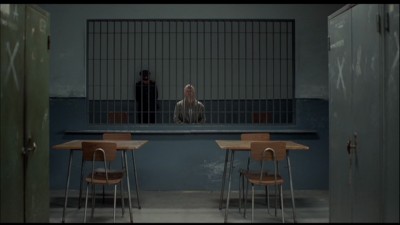
THE DVD:
The anamorphic, 1.85:1 aspect-ratio anamorphic transfer is quite good; the films' visual sense is more in the composition and the subdued quality of the lighting/colors than in anything brash or bright, so the very occasional aliasing and the possible slight overuse of DNR don't present any insurmountable (or, most often, even noticeable) issue at all.
Sound:The film's Dolby Digital 2.0 soundtrack is perfectly clear and vibrant, capturing all the film's layers of dialogue and background sound in perfect balance, with no distortion.
Extras:None, which is especially unfortunate in this context, since apparently the film's European release included an additional, earlier short by Mingiu, "Turkey Girl," which would have been a perfect supplement. Ah, well; the film itself, as it is, more than suffices.
FINAL THOUGHTS:As the only film Romanian cinéaste Cristian Mungiu has directed since his triumphant 4 Months, 3 Weeks, and 2 Days, any dedicated cinephile will want to treat themselves to this compendium of six Mungiu-scripted shorts, even though he spread out and shared the directing duties over the various segments. His probing, observant, wry, and tender sensibility is all over the entire affair, and he proves himself to be as strong a voice when he's turning his social-observational and human-interaction skills to comedy of varying types as he was when applying them to the soberingly dramatic in 4 Months, 3 Weeks. Tales of the Golden Age goes for the unlikely lighter side of Iron Curtain repression, but it actually manages to integrate the laughs very well, without trivializing in any way the discouraging futility felt by most Romanians in the waning days of the Soviet bloc; Mungiu and company pull this off mostly through finding in those strained sociopolitical circumstances the same universal, comical human self-deception and fumbling that have always existed in abundance anywhere and everywhere else in the world. If ever you find yourself obligated to make the case that "light" doesn't necessarily mean "insubstantial" or that sharp humor and serious, socially-aware insightfulness can work complementarily rather than canceling each other out, you need look no further than this funny, rousing, and ultimately moving series of shorts for some very convincing evidence. Highly Recommended.
|
| Popular Reviews |
| Sponsored Links |
|
|
| Sponsored Links |
|
|
| Release List | Reviews | Shop | Newsletter | Forum | DVD Giveaways | Blu-Ray | Advertise |
|
Copyright 2024 DVDTalk.com All Rights Reserved. Legal Info, Privacy Policy, Terms of Use,
Manage Preferences,
Your Privacy Choices | |||||||









